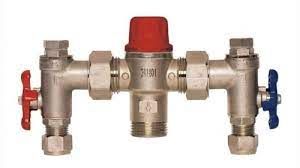The Importance of TMV Servicing
Temperature Mixing Valves (TMVs) play a crucial role in maintaining safe water temperatures, preventing scalding, and controlling the growth of harmful bacteria. However, the effectiveness of TMVs relies heavily on proper maintenance and servicing.
In this blog, we delve into the importance of TMV servicing and its impact on water safety.
Moreover, TMVs play a significant role in controlling the growth of Legionella bacteria, which can cause severe respiratory illnesses, including Legionnaires’ disease. Legionella thrives in warm water environments, and TMVs, if not properly maintained, can become breeding grounds for these harmful pathogens.
The Importance of TMV Servicing
Safety Compliance: Compliance with safety regulations and standards is essential to ensure the well-being of building occupants. TMVs are often subject to regulatory requirements mandating regular maintenance and testing. Failure to comply with these guidelines can result in legal liabilities and pose risks to public health.
Prevention of Scalding: Scalding incidents can cause severe injuries, especially among vulnerable populations such as children and the elderly. TMVs are designed to prevent such accidents by regulating water temperature. Regular servicing ensures that TMVs continue to function correctly, minimizing the risk of water reaching dangerously high temperatures.
Control of Legionella: Legionella bacteria proliferate in water systems that are not properly maintained or controlled. TMVs can become contaminated with Legionella if they are not serviced regularly. By ensuring that TMVs operate within the optimal temperature range, servicing helps mitigate the risk of Legionella growth and transmission.
Optimal Performance: Over time, TMVs may experience wear and tear, leading to decreased performance and efficiency. Sediment, scale, and other contaminants can accumulate within the valves, affecting their ability to blend water accurately. Routine servicing involves cleaning, inspection, and calibration of TMVs to ensure they operate at peak efficiency.
Longevity of Equipment: Like any mechanical device, TMVs require regular maintenance to extend their lifespan. Servicing helps identify and address issues early, preventing costly repairs or replacements in the future. By investing in TMV servicing, building owners can protect their equipment investment and avoid unexpected downtime.
The Risks of Neglecting TMV Servicing
- Increased risk of scalding incidents: Malfunctioning TMVs can lead to water temperatures exceeding safe limits, resulting in scalding injuries.
- Exposure to waterborne pathogens: Without proper maintenance, TMVs can harbor Legionella and other harmful bacteria, putting building occupants at risk of waterborne diseases.
- Non-compliance with regulations: Failure to maintain TMVs in accordance with regulatory requirements can lead to fines, legal action, and reputational damage for businesses and organizations.
- Reduced efficiency and lifespan: Neglected TMVs are more prone to breakdowns and may require premature replacement, leading to increased costs and downtime.
- Compromised reputation: Facilities that fail to prioritize water safety may face public scrutiny and loss of trust among stakeholders, including customers, patients, and employees.
Conclusion
TMVs are vital components of water systems, providing essential safety measures to protect users from scalding and waterborne illnesses. Regular servicing and maintenance are imperative to ensure TMVs function effectively and meet safety standards. By investing in TMV servicing, you can contribute to safer environments, protecting the health and well-being of individuals and upholding their commitment to water safety.

